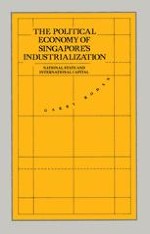
1989 | OriginalPaper | Chapter
Theoretical Introduction
Author : Garry Rodan
Published in: The Political Economy of Singapore’s Industrialization: National State and International Capital
Publisher: Palgrave Macmillan UK
Included in: Professional Book Archive
Activate our intelligent search to find suitable subject content or patents.
Select sections of text to find matching patents with Artificial Intelligence. powered by
Select sections of text to find additional relevant content using AI-assisted search. powered by
Traditionally the economies of the developing countries, or the Third World, have tended to play a specific and limited role in the international division of labour. Principally they have exported raw materials and agricultural products. Over recent decades this pattern has undergone significant change, so much so that it is widely contended that the emergence of a new international division of labour (NIDL) has begun. Unlike the old structure, this NIDL involves the developing countries in manufacturing production, although predominantly in those aspects of production which are labour-intensive and relatively unskilled. Such a specialisation has become possible with technological advances which allow for the decomposition of the production process. This has facilitated a global optimisation in the exploitation and allocation of the factors of production, a process referred to as ‘worldwide sourcing’. The emerging NIDL has thus been affected by an unprecedented degree of mobility by international capital.